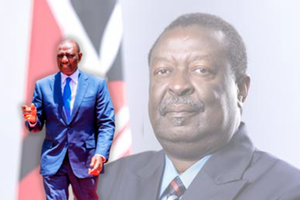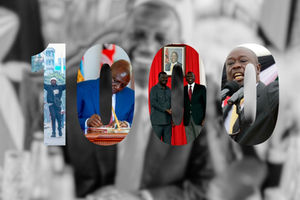
President William Ruto
Since taking over from Uhuru Kenyatta on September 13, 2022, President William Ruto has turned Kenya’s foreign policy on its head, in the process causing diplomatic tensions with neighbours such as Sudan, Democratic Republic of Congo (DRC), South Sudan and Somalia.
Kenya was once seen as a beacon of peace and a trusted mediator and regional peacemaker. Key milestones include negotiating in Sudan which resulted in the 2005 Comprehensive Peace Agreement (CPA), the formation of the Somali government in 2004, and contributing to peacekeeping missions in Somalia and South Sudan.
The "War Facilitator" label
But diplomacy experts now call Kenya a “war facilitator” even as President Ruto was named African Union (AU) Champion for Institutional Reforms in January 2024, taking over from President Paul Kagame of Rwanda.
Critics allege that Kenya is choosing sides in disputes rather than serving as an impartial arbiter because of its growing economic interests, strategic aspirations, and security considerations.
Prof Peter Kagwanja, CEO of the Africa Policy Institute, Kenya’s foreign policy under the Ruto government has shifted from traditional diplomacy based on national interests and pan-Africanism to other interests.
In February 2025, Kenya allowed Sudanese rebels, the Rapid Support Forces (RSF) and their 24 allied political parties and civil society, to convene in Nairobi to establish a “parallel government.”
The move elicited widespread condemnation, both locally and internationally, with Kenya being accused of taking sides in the Sudanese war, courtesy of the widely perceived business connections between Kenyan leaders and RSF leader, Mohamed Hamdan Daglo, commonly known as Hemedti.
These claims sparked concerns about Kenya’s neutrality and its role in regional stability.
Malik Agar, vice-chairman of the Sudan Sovereign Council, wrote a letter accusing Kenya of flouting the AU principle of non-interference in the internal affairs of member states and an “assault” on Sudan’s sovereignty. Sudan subsequently recalled its ambassador to Kenya, Kamal Jabara, and cut all trade links with Nairobi, potentially wiping out $48.2 million in revenues from exports of mainly tea and tobacco.
Kenya Human Rights Commission, a local NGO, issued a statement stating that Kenya’s decision to host the RSF in Nairobi to form a “parallel government” was a grave violation of its international obligations, including the UN Charter, the AU Constitutive Act, and the Convention on the Prevention and Punishment of the Crime of Genocide.
“Moreover, this move undermines Sudan’s sovereignty, constitutes an act of hostility against its people, and disregards the immense suffering of countless Sudanese civilians and ongoing peace efforts,” said the statement issued on February 28.
But RSF and its allies argued that the launch of the “Political Charter for the Government of Peace and Unity” was meant to build national consensus, which includes all political, civil, and social forces, laying the foundation for a new phase of stability and sustainable peace.
Kenya has denied allegations of supporting the RSF, stating that its involvement was aimed at facilitating dialogue and peace in the region.
Economic interests at play?
Prime Cabinet Secretary Musalia Mudavadi, who is also the Cabinet Secretary for Foreign and Diaspora Affairs, maintained that Kenya was simply providing a platform for dialogue that aligns with Kenya's longstanding role in regional peace negotiations
"It is important at this juncture to reiterate that no parallel government for Sudan was formed in Nairobi. Kenya abhors the balkanisation of sovereign states and supports a unified Sudan for the people of Sudan," he said then.
Yet, Kenya’s open dalliance with the RSF essentially confirmed the Sudan Sovereign Council’s 2023 rejection of Kenya’s leadership of the Quartet formed by the Inter-Governmental Authority on Development (Igad) to facilitate peace in Sudan.
Sudan's de facto ruler Gen Abdel Fattah al-Burhan, openly rejected Ruto’s leadership of the Quartet, comprising Kenya, South Sudan, Ethiopia and Djibouti, accusing Nairobi of sympathising with Gen Daglo.
His deputy, General Yasser al-Atta, Assistant Commander-in-Chief of the Sudan Armed Forces, criticised President Ruto for allegedly interfering in Sudanese internal affairs.
“President Ruto should leave East African reserve forces alone, and instead he should come along with the Kenyan army to face us,” Gen al-Atta said in July 2023.
In DRC, Kenya had a diplomatic tiff with the government of President Felix Tshisekedi in December 2023, when it allowed the launch of a Congolese rebel alliance in the capital, Nairobi.
The launch of a politico-military alliance, Congo River Alliance, was led by Corneille Nangaa, former head of DR Congo's electoral body, and the head of M23 Bertrand Bisimwa.
This forced the DRC government to recall its envoy to Kenya, after President Ruto declined calls to arrest the rebels, arguing that it would have been “undemocratic”.
"Kenya is a democracy. We cannot arrest anybody who has issued a statement. We do not arrest people for making statements, we arrest criminals," President Ruto said at a press conference.
In South Sudan, Kenya's overt and covert backing of President Salva Kiir's administration has occasionally damaged the legitimacy of the peace negotiations in which it takes part. While President Ruto’s foreign policy on South Sudan has not changed much from that of his predecessor Kenyatta, his recent attempts to broker peace between the government and the holdout groups have virtually collapsed.
Kenya's official stance
Popularly known as Tumaini Peace Initiative, the Kenya-led mediation was launched in May 2024 after Nairobi took over from the Community of Sant'Egidio to lead the talks between the South Sudan government and opposition groups that did not sign the 2018 peace agreement.
The talks reached a stalemate in February, when the government delegation pushed for Tumaini to be an annexe of the 2018 agreement, while the opposition, United People’s Alliance, maintains it has to be a standalone agreement.
President Ruto suspended the talks on February 20 with the promise of resuming in March, but the current political crisis in South Sudan has pushed the talks to the back burner.
Notably, the National Salvation Front (NAS)—one of the groups that are fighting the Juba government in Equatoria—had refused to join the Tumaini talks, citing Kenya’s record of arresting and handing over South Sudanese rebels to Juba.
NAS leader Gen Thomas Cirillo told The East African that his movement did not trust Kenya to remain neutral and was concerned about their security, given that the whereabouts of two opposition supporters, Dong Luak and Aggrey Idri, who were reportedly arrested by Kenyan security agents and renditioned to Juba in 2017, are yet to be established.
In Somalia, Kenya’s relations with the self-declared independent Somaliland have often elicited complaints from Mogadishu that Nairobi undermines its sovereignty.
Somaliland state president Abdirahman Mohamed Abdullahi Irro officially opened its “Mission Office” in Nairobi on May 29, two days after the Kenyan government halted the planned opening because it recognises the One Somalia policy.
The Ministry of Foreign and Diaspora Affairs issued a directive stating that the Liaison Office could not be upgraded to a diplomatic mission, reinforcing its commitment to Somalia’s territorial integrity. The Somaliland Liaison Office in Nairobi has been operational since October 2018.
Somaliland declared itself an independent state in 1991 following the collapse of the Siad Barre regime, but it has yet to gain international recognition, though it maintains informal or limited relations with the United Kingdom, United Arab Emirates, Ethiopia and Taiwan.
See some of our other Ruto@1,000 coverage below:






